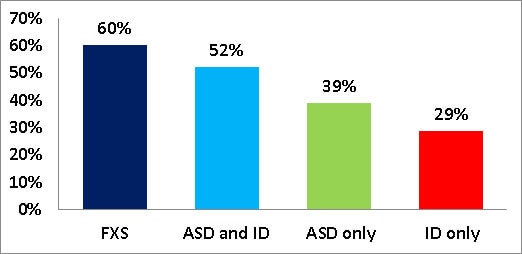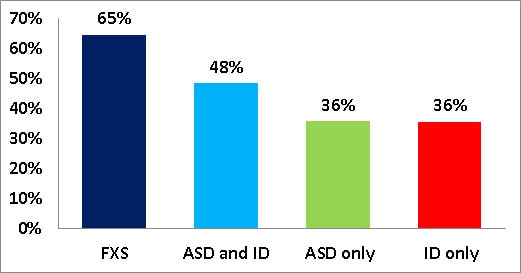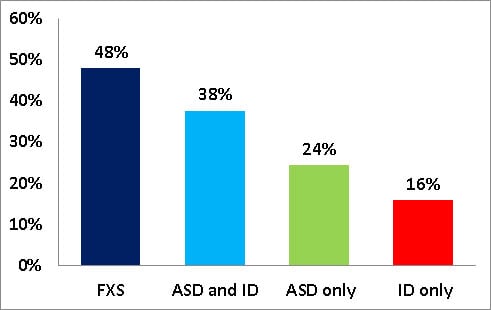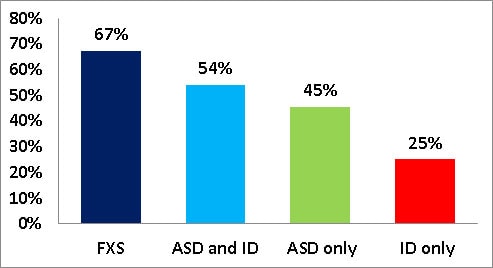Key Findings: A comparison of family, financial, and employment impacts of fragile X syndrome, autism, and intellectual disability

Researchers at the National Center on Birth Defects and Developmental Disabilities, CDC, along with RTI International, published findings from a study on the financial expense of caring for a child living with fragile X syndrome as compared to caring for a child with autism spectrum disorder (ASD), a child with intellectual disability (ID), or a child with both ASD and ID. Healthcare professionals can help families by understanding the financial and employment impact when addressing the complex needs of children living with fragile X syndrome (FXS).
Fragile X syndrome is the most common known inherited cause of intellectual disability. The signs and symptoms of FXS vary greatly from person to person. Learning disabilities, social and behavioral problems, developmental delays, and autism are common, as are anxiety, seizures and irritability. Children and adults with full mutation FXS may have problems with memory, abstract thinking, and executive functions. Executive functions are those activities where an individual plans and implements actions and develops problem-solving strategies.
Caring for a child with FXS often has a significant impact on families and caregivers, especially when that child has the severe symptoms that accompany this complex condition. The amount of time and resources needed to care for a child with FXS may lead families to make difficult decisions about their own employment.
The findings from this study are based on a caregiver survey completed by 350 families. These data were compared with groups compiled from the National Survey of Children with Special Health Care Needs.
Important findings from this study
Percentage of families reporting financial expense

This study found that more families caring for a child with FXS reported excessive financial expense as compared to families caring for a child with ASD, with an ID, or those caring for a child with both ASD and ID.
Percentage of families reporting a change in their work hours

This study found that more families caring for a child with FXS reported changing their work hours as compared to families caring for a child with ASD, with an ID, or those caring for a child with both ASD and ID.
Percentage of families reporting behavior problems

This study found that more families caring for a child with FXS reported their child had behavioral problems as compared to families caring for a child with ASD, with an ID, or those caring for a child with both ASD and ID. Behavior problems may include acting out, fighting, bullying, or arguing.
Percentage of families reporting anxiety in affected child

This study found that more families caring for a child with FXS reported their child was diagnosed with anxiety as compared to families caring for a child with ASD, with an ID, or those caring for a child with both ASD and ID.
Interpreting the findings
The complex nature of FXS may contribute to the overall impact on the family. Children with FXS may have more functional limitations, behavioral issues, and complex healthcare needs than children with ASD or ID only. Additionally, a higher percentage of children with FXS had irritability or a fair or poor ability to learn, understand, and pay attention. All these factors increase the amount of time and attention needed to care for a child with FXS, and may lead parents to make decisions about their own employment.
Regardless of whether the child has FXS, ASD, ID or a combination of ASD and ID, caring for a child with anxiety, seizures, greater irritability, or limits in thinking, reasoning, and learning ability was associated with greater caregiver financial and employment impact.
Implications of these findings
- Studying the family and employment impact of FXS adds to the overall understanding of the condition. This research provides context for the broader discussion of early diagnosis, care, and proper management of FXS.
- Additional research is needed on access to care and unmet needs for children with FXS and their caregivers, and the factors contributing to a greater impact on family finances.
About the study
- This research focuses on families who have a child with full mutation FXS. Information on families with a child who has FXS was gathered from surveys completed by parents. These parents reported the FXS testing results of their children. The sample was limited to those with a son or daughter who was 17 years old or younger. This age range was selected to match the comparison groups selected from the National Survey of Children with Special Health Care Needs.
- This study reinforces existing research. This study reinforces existing research indicating that the interaction of ID and co-occurring medical, behavioral and mental health problems result in a greater impact on families than when just one of these conditions is present. Additionally, this research is consistent with earlier findings documenting substantially higher overall healthcare costs for children with FXS as compared to those diagnosed with ASD or ID only.
- These findings may not represent the experiences of all families with a child who has FXS. The sample of caregivers from the FXS survey was relatively well educated and just one-fifth had low family incomes. The comparison group was selected to be similar. Since caregiver impact may vary by socioeconomic status, these results cannot necessarily be generalized to all parents of children with FXS, ID, or ASD.
What you can do
- FXS is a complex condition. Healthcare professionals, therapists, teachers, and childcare providers working together as a team may provide valuable support to the family and the child with FXS.
- Healthcare professionals and others can help by considering the financial and employment impact when addressing the complex needs of children with FXS and their families.
- Taking advantage of all the resources available in the community will help guide success. Early intervention services help children from birth to 3 years old (36 months) learn important skills. These services may support a child’s development. Even if a child has not been diagnosed with FXS, he or she may be eligible for services. These services are provided through an early intervention system in each state.
Resources
- CDC’s FXS homepage
- Consensus Documents on FXS Clinical Practices (National Fragile X Foundation)
- Map of FXS clinics and FXS Community Support Networks (National Fragile X Foundation)
- National Library of Medicine FXS Website
Notes
- The FXS survey from which these data were drawn was funded by a contract from Novartis Pharmaceutical Corporation to RTI International.
- The comparison group was compiled from the National Survey of Children with Special Health Care Needs 2009-2010.
Reference for Key Findings
Ouyang L, Grosse SD, Riley C, Bolen B, Bishop E, Raspa M, Bailey DB Jr. A comparison of family financial and employment impacts of fragile X syndrome, autism spectrum disorders, and intellectual disability. Research in Developmental Disabilities; July 2014; 35(7):1518-27.
